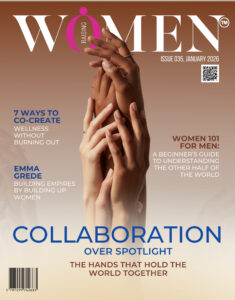By May Ikeora-Amamgbo
There is a verse many of us know by heart: “Many are called, but few are chosen” (Matthew 22:14). It is often quoted to justify exclusivity, to keep doors half open, or to imply that divine selection is a lottery of favour. But what if we have been read-ing it wrong? What if the real revolution is not in who is chosen, but in who dares to answer? In this summer’s edition themed Saints and Summer Heat: Women Unapologetically Taking Space, we say this boldly and clearly: you were not just called, you were chosen and you do not need permission to shine.
Reframing the Sacred Call
The phrase “many are called” is not a spiritual disclaimer, it is an invitation. Heaven never whispers in small print. Every woman, regardless of where she was born or how she was raised, carries a divine imprint. A calling is not exclusive to prophets or CEOs or bestselling authors. It lives in the quiet courage of a girl who applies to university after years of doubt. It breathes in the decision to walk away from what no longer honours your spirit. It rises in boardrooms and birth rooms, on stages and street corners.
We are all called. Every single one of us. The real question is: who answers? To be “chosen” is not about favouritism. It is about alignment. Biblically, the ones who were “chosen” were not perfect, they were willing. Esther, a Jewish orphan turned queen, was chosen not because of her title, but because she dared to use it for such a time as this. Mary, a young girl from Nazareth, was chosen not because of rank, but because she said yes to a disruptive miracle. Deborah, the judge and prophetess, led men into battle because she did not wait for an invitation, she recognised the call and walked in it.
The Real Cost of Being Chosen
Calling is glamorous in theory but gritty in practice. To be chosen is not to be handed a crown, it is to be handed a cross, a challenge, a commitment. That book deal, that venture capital, that family you are raising, that movement you are leading, it will cost you something. But anything worth birthing always does.
The chosen are not those with the cleanest résumés. They are the ones who keep showing up when no one claps. The ones who rebuild after rejection. The ones who learn to speak even when their voice shakes. The ones who embrace their duality, soft and steel, faith and fire. There is a reason why the call often comes in whispers. It is not because it is timid, but because it is sacred. And only those who are still enough to hear it and brave enough to move will walk it out.
You Are Not an Accident
Let us get something clear: there is nothing accidental about your existence. You were designed with intention, not randomness. Science now tells us that the probability of you being born, with your exact DNA, is about 1 in 400 trillion. Read that again. You are a walking miracle in motion.
In Africa, we have a tradition of naming that affirms identity. Names like Ngozi (blessing), Zanele (we are enough), Amahle (the beautiful ones), Favour, and Gift are not random, they are prophetic declarations. Yet somewhere between growing up and growing tired, many women forget that they are answers to prayers, solutions in flesh.
If we do not remind women of their chosen-ness, the world will name them everything but divine, too loud, too emotional, too much. But when we realise we are chosen, we stop shrinking. We stop asking for seats and start building tables. We stop apologising for our light and start using it to lead.
Summer Saints and Sacred Disruption
This is not just about individual purpose. It is about collective power. We are in an era of sacred disruption where women across the globe are rising in politics, entrepreneurship, advocacy, and arts. They are not waiting to be chosen by a system. They are choosing themselves. From Wanjira Mathai championing climate justice in Africa, to Dr Ngozi Okonjo Iweala redefining leadership at the World Trade Organisation, to Angelique Kidjo creating healing through sound, the message is clear: being chosen is not a favour, it is a function. And yes, with great calling comes great contradiction. You may be both feared and admired. You may be celebrated and misunderstood. But what is sacred was never meant to be simple.
Choosing Yourself Again and Again
You do not need a burning bush or a prophetic dream to know you are chosen. Sometimes, the calling is quiet. It looks like resilience in motherhood. It smells like coffee at 5am before your side hustle begins. It feels like telling your truth in a culture that silences women. It sounds like turning your pain into poetry and your wounds into wisdom.
If you are waiting for external validation before you walk in your calling, you will wait forever. The heavens already voted. You win. And when imposter syndrome creeps in, remind yourself that you were not placed here to blend in. You were planted to bloom. Even in dry places. Even in summer heat. So say yes. Not because you have it all figured out, but because you are finally tired of playing small.
You are the salt. You are the light. You are the sign someone has been praying for. You are not just called. You are chosen.
And as always, remember: your light is not too much. It is exactly enough. So go on, find her light and shine it all the way through.







